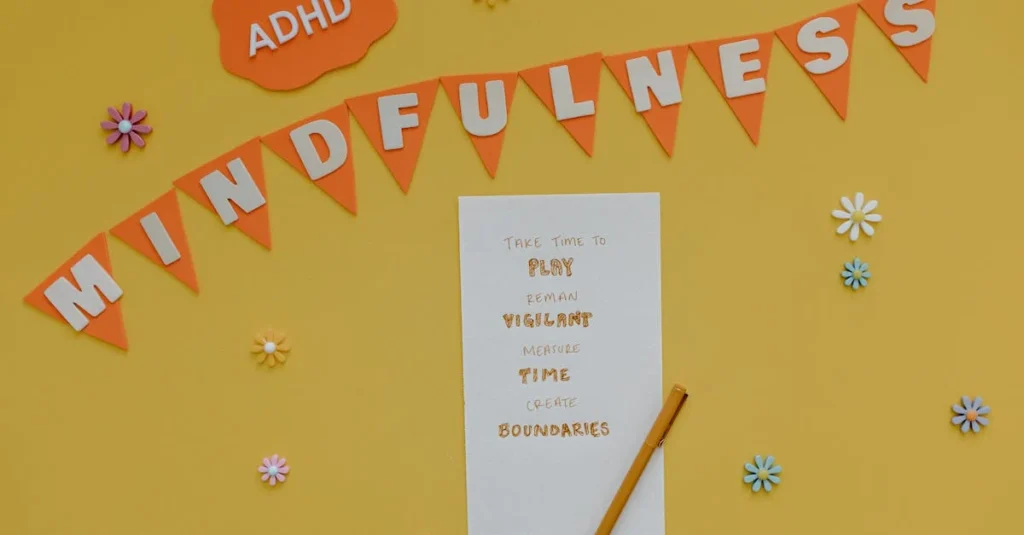Living with ADHD can be a challenging journey, often marked by distractions and impulsivity. Yet, an emerging approach offers hope—mindfulness. This powerful practice encourages individuals to focus on the present moment, fostering greater awareness and emotional regulation.
By incorporating mindfulness for ADHD, those with ADHD can enhance their concentration and reduce anxiety. Simple practices such as meditation and breathing exercises can make a significant difference in daily life. As more people discover the benefits of mindfulness, it’s becoming a vital tool in managing ADHD symptoms and promoting overall well-being.
Mindfulness for ADHD
ADHD, or Attention-Deficit/Hyperactivity Disorder, affects individuals in various ways. Common symptoms include difficulties with attention, hyperactivity, and impulsive behaviors, which can create significant challenges in daily life.
Symptoms and Challenges
ADHD presents multiple symptoms that impact functioning. Common symptoms involve:
- Inattention: Difficulty sustaining focus, frequent careless mistakes, and challenges following through on tasks such as homework and work assignments.
- Hyperactivity: Excessive fidgeting, difficulty staying seated, and constant movement that appears driven by a motor.
- Impulsivity: Interrupting conversations, acting without thinking, and difficulty waiting for turns during activities or conversations.
These symptoms can hinder academic performance, occupational responsibilities, and personal relationships, leading to frustration. Adults with ADHD may struggle to maintain organization and prioritize tasks, while children often find it hard to comply with classroom expectations.
Traditional Treatment Options
Several traditional treatment options exist for managing ADHD. Common approaches include:
- Medications: Stimulant medications, like methylphenidate and amphetamines, often improve focus and decrease impulsivity. Non-stimulant options, such as atomoxetine, also provide symptom relief.
- Cognitive Behavioral Therapy (CBT): CBT helps individuals manage the emotional aspects of ADHD. It focuses on developing coping strategies and improving organizational skills.
- Behavioral Interventions: These interventions reinforce positive behaviors and minimize negative behaviors through structured environments and reward systems.
- Psychoeducation: Educating individuals and families about ADHD promotes understanding and effective communication. This knowledge enables the development of supportive strategies at home and school.
Combining these treatment options can enhance overall effectiveness, addressing symptoms more comprehensively.
The Role of Mindfulness
Mindfulness plays a crucial role in managing ADHD symptoms by fostering awareness of thoughts, feelings, and sensations in the present moment. Practicing mindfulness can lead to improvements in focus, emotional regulation, and overall well-being.
Definition of Mindfulness
Mindfulness refers to the practice of maintaining a moment-by-moment awareness of thoughts, feelings, bodily sensations, and the surrounding environment. It encourages a non-judgmental observation that allows individuals to experience their reality fully. Techniques such as meditation and deep breathing exercises are commonly employed to cultivate this state of awareness.
How Mindfulness Helps with ADHD
Mindfulness for ADHD helps in several key ways:
- Increased Attention: Regular practice enhances attention span by training the brain to focus on a single task, reducing susceptibility to distractions.
- Emotional Regulation: Mindfulness fosters a better understanding of emotional responses, enabling individuals to manage impulsive reactions more effectively.
- Stress Reduction: Mindfulness techniques lower anxiety levels, which can help mitigate the stress that often accompanies ADHD challenges.
- Improved Executive Functioning: Engaging in mindfulness practices enhances skills such as planning, organization, and decision-making, which are often difficult for individuals with ADHD.
- Enhanced Self-Awareness: Mindfulness promotes self-reflection, aiding individuals in recognizing their triggers and developing coping strategies.
Implementing mindfulness practices can provide significant benefits for those managing ADHD, leading to a heightened sense of control and improved daily functioning.
Mindfulness Techniques
Mindfulness techniques offer practical strategies for individuals with ADHD to enhance focus and emotional regulation. These techniques include breathing exercises, meditation practices, and grounding techniques.
Breathing Exercises
Breathing exercises provide a simple yet effective way to cultivate mindfulness. Techniques such as deep breathing and diaphragm breathing promote relaxation and help individuals center their thoughts. One effective method involves inhaling deeply for four counts, holding the breath for four counts, and exhaling slowly for six counts. This exercise can reduce anxiety and improve attention span by redirecting focus to the breath.
Meditation Practices
Meditation practices support the development of mindfulness in daily life. Options such as body scan meditation, guided imagery, or mindfulness meditation encourage individuals to observe their thoughts without judgment. For instance, a body scan involves paying attention to various parts of the body, promoting a sense of physical awareness and relaxation. Setting aside as little as five to ten minutes daily for meditation can lead to noticeable improvements in focus and emotional balance.
Grounding Techniques
Grounding techniques establish a connection between the mind and body, aiding individuals with ADHD in managing overwhelming feelings or distractions. Techniques like the 5-4-3-2-1 method can help enhance present-moment awareness. This involves identifying five things one can see, four things one can touch, three things one can hear, two things one can smell, and one thing one can taste. Grounding techniques offer immediate relief from anxiety and distraction, anchoring individuals in the current moment.
Benefits of Mindfulness for ADHD
Mindfulness offers several significant benefits for individuals with ADHD. These include improved focus and concentration, as well as enhanced emotional regulation, which can lead to better overall functioning.
Improved Focus and Concentration
Mindfulness practices contribute to improved focus and concentration for individuals managing ADHD. Regular engagement in mindfulness techniques trains the brain to sustain attention on present-moment experiences. Research indicates that mindfulness meditation can activate areas of the brain responsible for attention control. By practicing techniques such as breathing exercises and body scanning, individuals can reduce distractions and sharpen their focus. Studies show that consistent mindfulness practice can increase attention span and lead to more effective task completion.
Emotional Regulation
Mindfulness significantly enhances emotional regulation for those with ADHD. This practice encourages individuals to observe their emotional states without judgment, promoting a greater understanding of their feelings. By cultivating self-awareness, mindfulness enables effective management of impulsive reactions and emotional outbursts. Research highlights that mindfulness reduces emotional reactivity, allowing individuals with ADHD to respond to situations more thoughtfully. Regular mindfulness practice encourages patience and resilience, equipping individuals with strategies to handle stress and emotional challenges.
Unlocking Potentials
Mindfulness offers a powerful approach for individuals managing ADHD. By fostering present-moment awareness and emotional regulation, it equips them with tools to navigate daily challenges more effectively. The integration of mindfulness techniques can lead to significant improvements in focus and emotional balance, enhancing overall well-being.
As awareness of mindfulness continues to grow, its role in ADHD management becomes increasingly vital. Embracing these practices can empower individuals to take control of their symptoms and improve their quality of life. With consistent effort and dedication to mindfulness, those with ADHD can unlock their potential and thrive in various aspects of life.



